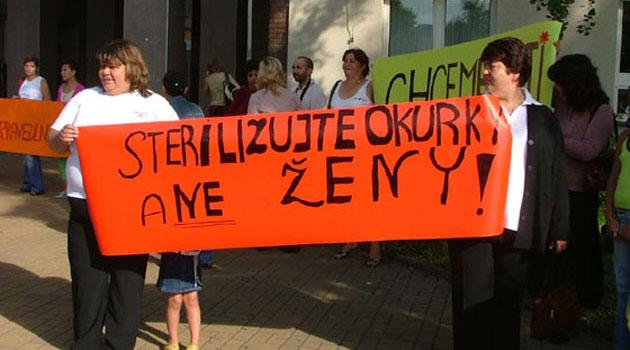Czech Republic: Victims of illegal sterilizations could receive CZK 300 000 in compensation

Victims of illegal sterilizations could receive compensation from the Czech state in the coming years of CZK 300 000 (EUR 11 000). Persons who underwent such surgery between 1 July 1966 and 31 March 2012 without giving informed consent would be eligible.
People whose legal guardians consented to such operations on their behalf would also be eligible. Those are the draft outlines of a law designed by Czech Human Rights Minister Jiří Dienstbier (Czech Social Democratic Party – ČSSD) and his team.
Persons living with disabilities and Romani women are expected to qualify for the compensation. "The draft special law establishes the rules that will help victims who have been unable to seek compensation through the courts or any other way," the authors of the bill say.
Those drafting the law note that not all sterilizations performed in the country have been illegal or in violation of applicable regulations. The European Roma Rights Center (ERRC) raised suspicions in 2004 that primarily Romani women in the Czech Republic were being forciby sterilized.
Dozens of women then applied to the ombud and some also turned to the courts. The Czech Government Committee against Torture proposed introducing compensation in 2006.
In 2009 the cabinet apologized for the illegal surgeries. The Czech Republic has been criticized by international organizations for having violated the victims’ human rights and for having failed to compensate them for the harms suffered.
The bill will apply to almost a 46-year-long time period determined by the time during which the People’s Healthcare Act and subsequently adopted norms have been in effect. A sterilization is considered illegal if the person sterilized did not freely decide to undergo the operation.
The authors of the bill say it does not matter whether this lack of a freely-made decision was because of pressure, persuasion, the promise of welfare in exchange for sterilization, threats to take away existing children should sterilization be refused, release from an institution being conditioned upon sterilization, or because imprecise information about the impact of the surgery was given to the patient. It is not clear how many people might receive compensation.
Records show that in 1989 a total of 803 people, 419 of them Romani women, were paid welfare benefits in exchange for sterilization, according to a Czech Government report. The costs for compensation, according to estimates, could range from tens of millions to hundreds of millions of crowns.
According to the bill, victims could receive an apology, compensation in the amount of CZK 300 000, and the recovery of any costs they subsequently expended for other rehabilitation or treatment in order to conceive children. Victims would apply to the Czech Health Ministry, which would decide who is eligible for compensation.
The Czech Health Minister would make the final decision regarding any disputes requiring resolution. The minister would be advised by a nine-member commission of lawyers, physicians and social workers.
The costs per commission member are estimated at approximately CZK 386 000 annually. The ministry would have to hire 10 people to process applications.
Those workers would cost roughly CZK 5 million annually. According to the Government’s backgrounder on the bill, the main risk involved in the compensation process will be a lack of available evidence in certain cases.
The eligibility decision will be made on the basis of medical records about the surgery, but frequently such records are missing. It would be possible to use documentation from a gynecological examination or witnesses’ testimonials instead.
If victims would be unable to submit such materials with their applications, they would simply state when and where they underwent the surgery. The medical facility involved would then have to provide all of the documentation.
The bill would make it possible to file an application for compensation up to three years after the law on compensation takes effect. The Government originally planned to have a draft of the law ready last December, to have the full wording ready by the end of this year, and for the law to take effect as of mid-2016.